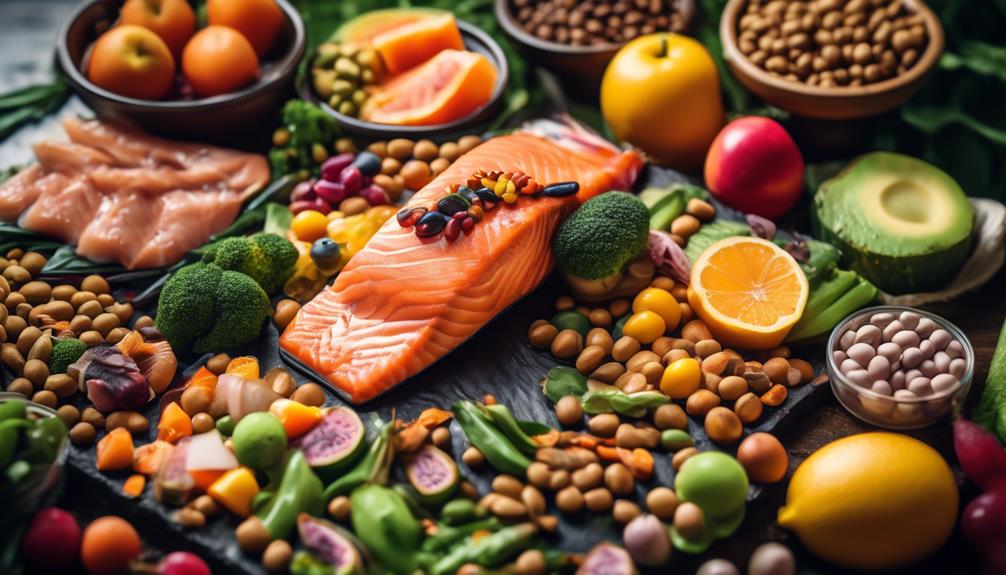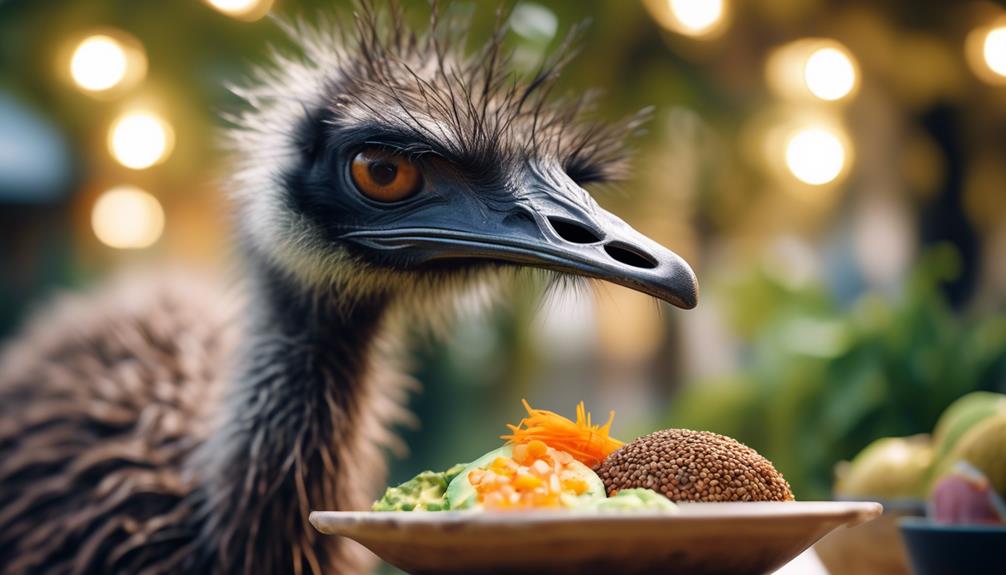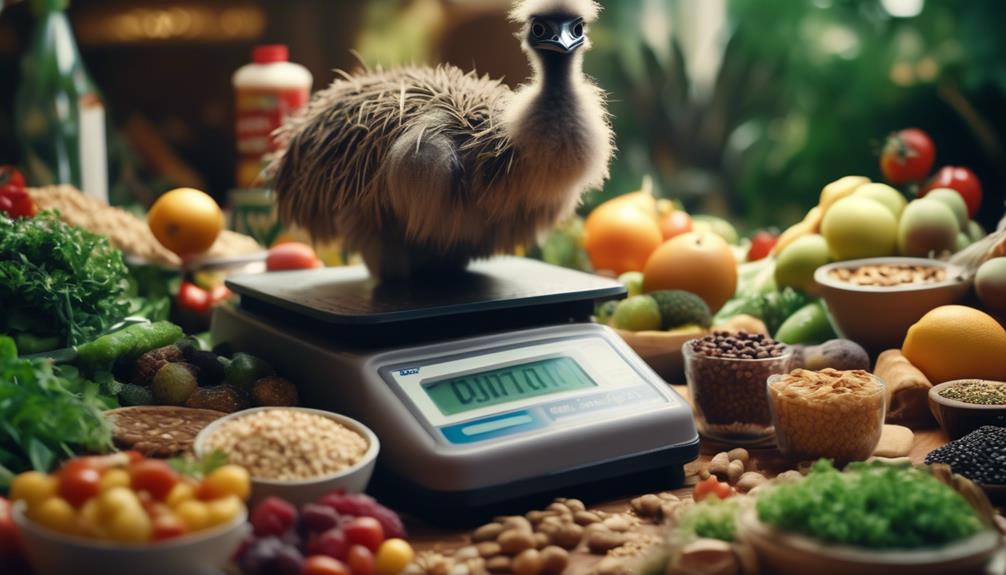
Did you know that emus have been known to eat up to 2.5 pounds of food per day? That's quite an appetite for these fascinating flightless birds. But what exactly should you be feeding them to ensure their optimal health and well-being?
In this discussion, we will explore the essential components of an emu's diet, including high-quality protein sources, the importance of fiber, and the role of healthy fats. Additionally, we'll delve into the plants and toxins that are harmful to emus and discuss the crucial role of water in their diet.
So, whether you're an emu enthusiast or simply curious about maintaining a balanced diet for these unique creatures, keep reading to discover the dos and don'ts of feeding emus.
Key Takeaways
- Emus require a balanced diet consisting of grasses, seeds, fruits, and vegetables, with a protein content of 16-20%.
- Lean meats like chicken, turkey, and fish, as well as plant-based sources like soybeans and peas, are good protein sources for emus.
- Fiber and healthy fats are important for gut health, weight management, cardiovascular health, and vitamin absorption.
- Emus should be fed twice a day with portion sizes approximately 1-2% of their body weight, and access to fresh water should always be available.
Understanding Emu Nutritional Needs
To ensure the health and well-being of your emus, it's essential to understand their nutritional needs. Emus, like all living creatures, require a balanced diet to thrive. Providing them with the right combination of essential nutrients is crucial for their overall health and optimal performance. Emu digestion is a complex process that involves the breakdown and absorption of nutrients to fuel their bodies.
Emus are herbivores and primarily consume plant-based foods. Their diet should consist of a variety of grasses, seeds, fruits, and vegetables. These provide essential vitamins, minerals, and fiber that support their digestive system and promote proper nutrient absorption. It's important to ensure that emus have access to fresh and clean water at all times, as hydration is vital for their well-being.
Additionally, emus require adequate protein intake for growth, development, and maintenance of their feathers, muscles, and organs. This can be achieved by incorporating sources of lean protein into their diet, such as insects, worms, and small vertebrates. However, it's crucial to consult with a veterinarian or an emu expert to determine the appropriate amount and source of protein for your emus.
Understanding emu nutritional needs is key to providing them with a well-balanced diet. By offering a variety of plant-based foods, ensuring proper hydration, and incorporating adequate protein sources, you can support their digestive health and overall well-being. Remember to consult with experts to ensure that you're meeting your emus' specific nutritional requirements.
Essential Components of an Emu Diet
Understanding the essential components of an emu diet is vital for meeting their specific nutritional requirements and promoting optimal health. Emus have a unique digestive system that allows them to efficiently break down and absorb nutrients from their diet. To ensure their digestive system functions properly, it is important to provide them with a balanced diet that includes the following key components:
| Component | Benefits |
|---|---|
| Protein | Essential for growth, repair, and reproduction. Emus require a diet with a protein content of 16-20%. |
| Carbohydrates | Provide energy for daily activities and metabolic processes. Emus can obtain carbohydrates from fruits, vegetables, and grains. |
| Fats | Necessary for maintaining healthy skin, feathers, and hormone production. Emus should be provided with a small amount of healthy fats like nuts and seeds. |
| Vitamins | Play a crucial role in various bodily functions, including immune system support and reproductive health. Emus need a wide range of vitamins such as A, D, E, and K. |
| Minerals | Important for maintaining strong bones, muscles, and overall health. Emus require minerals like calcium, phosphorus, and iron. |
| Water | Vital for digestion, nutrient absorption, and overall hydration. Emus should have access to clean and fresh water at all times. |
High-Quality Protein Sources for Emus

When providing high-quality protein sources for emus, it's important to consider their specific nutritional needs and digestive system. Emus require a diet that's rich in protein to support their growth, development, and overall health. High-quality protein sources are essential for emus as they provide the necessary amino acids that are needed for various physiological processes in their bodies.
One of the primary benefits of protein for emus is muscle development and maintenance. Emus are large flightless birds with powerful leg muscles, which allow them to run at high speeds. Protein plays a crucial role in muscle growth and repair, ensuring that emus have the strength and agility they need to thrive in their natural habitat.
In addition to muscle health, protein also contributes to the production of eggs in female emus. Protein is a vital component in the formation of egg yolks, which contain essential nutrients for the development of the embryo. By providing high-quality protein sources, emus can lay healthy eggs and contribute to the future generation of their species.
Some examples of high-quality protein sources for emus include lean meats such as chicken, turkey, and fish. These protein sources are low in fat and provide the necessary amino acids for emus' optimal health. Additionally, emus can also benefit from plant-based protein sources like soybeans and peas, which are rich in protein and can be easily digested by their unique digestive system.
The Importance of Fiber in an Emu's Diet
Including an adequate amount of fiber in an emu's diet is essential for maintaining their digestive health and overall well-being. Fiber plays a crucial role in promoting proper digestion and preventing digestive issues in emus. Here are some key benefits of fiber for emu digestion:
- Improved Gut Health: Fiber acts as a prebiotic, providing nourishment for beneficial gut bacteria. This helps maintain a healthy balance of gut flora, which is essential for optimal digestion and nutrient absorption.
- Prevention of Constipation: Adequate fiber intake ensures regular bowel movements, preventing constipation in emus. Fiber adds bulk to the stool, making it easier to pass through the digestive tract.
- Reduced Risk of Digestive Disorders: Emus that consume a fiber-rich diet are less likely to develop digestive disorders such as gastrointestinal inflammation or colic. Fiber helps maintain the integrity of the gut lining and supports proper digestive function.
- Weight Management: Fiber-rich foods are often low in calories and can help emus feel full for longer periods. This can be beneficial for weight management, preventing obesity and related health issues.
- Healthy Blood Sugar Levels: Fiber slows down the absorption of glucose, preventing spikes in blood sugar levels. This is crucial for emus at risk of developing metabolic disorders like diabetes.
Including a variety of fiber sources such as hay, grass, and leafy greens in an emu's diet will contribute to their overall gut health and well-being. Ensure that the emus have access to fresh water at all times to aid digestion and hydration.
Healthy Fats for Emu Health

Emus can benefit from incorporating healthy fats into their diet for optimal health and well-being. Just like humans, emus require a balance of different nutrients to thrive, and healthy fats play a crucial role in their overall diet.
In the wild, emus have access to a diverse range of foods, including insects, seeds, and plants, which naturally provide them with the essential fats they need. However, emus in captivity may not have the same variety of food available to them, making it important for their caretakers to ensure they receive adequate amounts of healthy fats.
Including sources of healthy fats in an emu's diet can have numerous benefits. Firstly, it promotes good cardiovascular health by reducing the risk of heart disease and improving blood lipid profiles. Additionally, healthy fats also aid in the absorption of fat-soluble vitamins, such as vitamins A, D, E, and K, which are essential for emu health. Furthermore, incorporating healthy fats into their diet can enhance their immune system and reduce inflammation, leading to improved overall health and a stronger defense against diseases.
When providing healthy fats to emus in captivity, it's important to choose sources that are natural and minimally processed. Good options include fish oil, flaxseed oil, and olive oil. These oils can be added to their regular feed or mixed with other foods to ensure they receive the necessary amount of healthy fats.
It's essential to consult with a veterinarian or an emu specialist to determine the specific dietary needs of your emus and to ensure you're providing them with the appropriate amounts of healthy fats.
Emu Diet Supplements: Pros and Cons
Emu diet supplements offer both advantages and disadvantages for their overall health and well-being. While these supplements can provide additional nutrients and support to their diet, it's important to carefully consider their benefits and drawbacks before incorporating them into an emu's feeding routine.
Benefits of Emu Diet Supplements:
- Enhanced nutrient intake: Supplements can help fill nutritional gaps and provide emus with essential vitamins and minerals they may not be getting from their regular diet.
- Improved feather health: Certain supplements, such as those containing omega-3 fatty acids, can promote healthy feather growth and strengthen the plumage.
- Enhanced immune system: Some supplements, like probiotics, can support the immune system of emus, helping them fight off illnesses and infections.
- Increased joint health: Supplements containing glucosamine and chondroitin can benefit emus with joint issues or arthritis, promoting better mobility.
- Enhanced overall well-being: Supplements can contribute to the overall health and vitality of emus, ensuring they thrive in their environment.
Drawbacks of Emu Diet Supplements:
- Over-supplementation risks: Excessive use of supplements can lead to imbalances or toxicity, potentially causing harm to the emus.
- Lack of regulation: The emu supplement market isn't well-regulated, making it crucial to carefully research and choose reputable brands.
- Expense: Quality supplements can be costly, adding to the overall expenses of raising and maintaining emus.
- Limited scientific evidence: While some supplements have shown promising results, scientific research on their effectiveness in emus is limited, making it essential to consult with avian experts.
- Potential digestive issues: Some emus may have sensitive digestive systems, and certain supplements can cause digestive upset or intolerance.
It is important to consult with a veterinarian or avian expert before introducing any new supplements into an emu's diet. They can provide guidance on appropriate dosage, potential interactions, and ensure the well-being of these magnificent birds.
Common Foods to Avoid Feeding Emus

To ensure the optimal health and well-being of your emus, it is important to be aware of common foods that should be avoided in their diet. While emus are known to have a diverse palate, there are certain foods that can pose potential health risks and should be avoided. Here is a list of common foods to avoid feeding emus:
| Foods to Avoid | Potential Health Risks |
|---|---|
| Avocado | Contains persin, toxic to birds |
| Chocolate | Contains theobromine, toxic to birds |
| Onions | Can cause hemolytic anemia |
| Garlic | Can cause digestive upset |
| Caffeine | Can be toxic to birds |
It is important to note that emus have a unique digestive system, and their bodies may not be able to tolerate certain substances that are harmless to other animals. Therefore, it is crucial to avoid feeding them these foods to prevent any potential health risks. By being mindful of their diet and providing them with a balanced and nutritious meal plan, you can ensure the well-being and longevity of your emus.
Harmful Plants and Toxins for Emus
Occasionally, certain plants and toxins can pose significant health risks to emus, making it crucial to be aware of these potential dangers. Emus, like many other animals, can be sensitive to certain toxic plants and may also develop food allergies. Here are some harmful plants and toxins that you should be cautious of when it comes to feeding your emus:
- Rhododendron and Azalea: These beautiful flowering plants contain toxins that can be harmful to emus. Ingesting even a small amount of their leaves or flowers can lead to symptoms such as vomiting, diarrhea, and even heart problems.
- Oleander: This widely cultivated shrub is highly toxic to emus. All parts of the plant, including its flowers, leaves, and even the water it has been standing in, can be dangerous. Ingestion of oleander can cause severe gastrointestinal issues, irregular heart rhythm, and even death.
- Nightshade: Both black nightshade and deadly nightshade are toxic plants that emus should avoid. Ingesting their berries or leaves can result in symptoms such as drooling, difficulty breathing, and even paralysis.
- Yew: Yew trees and bushes contain a toxin called taxine, which can be fatal to emus. Ingesting any part of the plant, including the berries and needles, can lead to symptoms such as tremors, seizures, and cardiac arrest.
- Milkweed: This plant is known for its toxic sap, which can be harmful to emus if ingested. Milkweed poisoning can cause symptoms such as drooling, depression, and even cardiac issues.
It's important to remember that emus have different dietary needs and sensitivities than other animals. Always consult with a veterinarian or an expert in emu care to ensure that you're providing a safe and suitable diet for your emus.
The Role of Water in an Emu's Diet

Water is an essential component of an emu's diet, playing a crucial role in maintaining their overall health and well-being. Hydration is vital for emus, as it helps regulate their body temperature, aids digestion, and supports various physiological functions. Emus require a sufficient intake of water to stay healthy and thrive in their environment.
Proper hydration is essential for emus as it helps regulate their body temperature. Emus are native to arid regions, where they're exposed to high temperatures. Water intake allows them to cool down through evaporative cooling, which helps prevent heat stress and related health issues. Emus also rely on water to support their digestion. Adequate hydration ensures the smooth functioning of their digestive system, aiding in the breakdown and absorption of nutrients from their diet.
In addition to temperature regulation and digestion, water intake provides other benefits to emus. It helps transport vital nutrients throughout their bodies and supports the proper functioning of their organs. Water is also crucial for maintaining healthy feathers, as it keeps their plumage clean and in good condition. Furthermore, hydration plays a role in joint lubrication, ensuring the flexibility and mobility of emus.
To ensure optimal hydration, emus should have access to clean and fresh water at all times. It's important to monitor their water intake and provide adequate amounts, especially during hot weather or periods of increased activity. By prioritizing the role of hydration in an emu's diet, you can contribute to their overall health and well-being.
Feeding Schedule and Portion Control for Emus
When it comes to feeding emus, establishing a proper feeding schedule and practicing portion control are crucial for their overall health and well-being. Emus have unique dietary needs, and understanding their feeding requirements will ensure they receive the necessary nutrients while avoiding potential health issues. Here are some important guidelines to consider:
- Feeding frequency: Emus should be fed twice a day, once in the morning and once in the evening. This regular feeding schedule helps maintain their metabolism and prevents overeating.
- Emu portion sizes: It's essential to control the portion sizes of emu feed to prevent obesity and related health problems. Each feeding should consist of approximately 1-2% of the emu's body weight. Consult with a veterinarian or an expert in emu care to determine the appropriate portion size for your emus.
- Monitor feeding behavior: Pay attention to how quickly your emus consume their food. If they finish their meal too quickly, it might indicate that the portion size is too small. On the other hand, if they take a long time to finish, it could suggest that the portions are too large.
- Provide access to fresh water: Alongside their regular feedings, emus should always have access to clean, fresh water. Hydration is essential for their overall health and digestion.
- Adjustments for growth and activity level: As emus grow or engage in more physical activity, their feeding requirements may change. Monitor their weight and consult with experts to make necessary adjustments to their feeding schedule and portion sizes.
Monitoring Emu Weight and Adjusting Their Diet

To ensure the health and well-being of your emus, it is crucial to regularly monitor their weight and make necessary adjustments to their diet. Emus, like any other animals, can experience weight fluctuations that may indicate underlying health issues or imbalances in their diet. By keeping a close eye on their weight and making appropriate dietary adjustments, you can help them maintain a healthy weight and optimal overall health.
One effective way to monitor emu weight is by using a weighing scale specifically designed for birds. Weigh your emus regularly, ideally once a week, and keep a record of their weight. This will help you track any changes and identify trends over time.
If you notice that your emus are gaining weight, it may be an indication that they are consuming more calories than they need. In this case, it is essential to adjust their diet accordingly. Reduce the portion sizes of high-calorie foods and increase the amount of low-calorie, nutrient-dense foods in their diet. This will help them maintain a healthy weight and prevent obesity-related health issues.
On the other hand, if your emus are losing weight or not gaining weight as expected, it may be a sign that they are not receiving enough nutrients. In such cases, consider increasing the portion sizes of their meals or adding more nutrient-rich foods to their diet. Consult with a veterinarian or an avian nutritionist for expert guidance on adjusting their diet to meet their specific needs.
Regular monitoring of emu weight and making necessary adjustments to their diet is an essential part of responsible emu care. By being attentive to their weight and nutritional needs, you can ensure that your emus stay healthy, happy, and thriving.
| Weight Monitoring Tips | Diet Adjustment Tips |
|---|---|
| Use a bird weighing scale to monitor their weight regularly | Reduce portion sizes of high-calorie foods if emus are gaining weight |
| Keep a record of their weight to track changes over time | Increase portion sizes or add nutrient-rich foods if emus are losing weight |
| Consult with a veterinarian or avian nutritionist for guidance | Ensure a balanced and varied diet for optimal nutrition |
Frequently Asked Questions
Can Emus Eat Fruits and Vegetables?
Emus can eat fruits and vegetables, as they are an important part of their diet. Their digestive system is well-equipped to handle plant matter, and they have a preference for these nutritious foods.
What Are Some Common Signs of Nutritional Deficiencies in Emus?
To prevent nutritional deficiencies in emus, it's important to be aware of common symptoms. Watch for signs like feather abnormalities, decreased appetite, and poor growth. Providing a balanced diet with proper nutrients is key.
Is It Necessary to Provide Emus With Vitamin Supplements?
It's important to provide emus with vitamin supplements to ensure their proper hydration and protein intake. Emus need these supplements to maintain their health and meet their nutritional needs.
Can Emus Consume Dairy Products?
Including dairy in an emu's diet has pros and cons. While it can provide calcium and protein, some emus may be lactose intolerant. Alternatives like leafy greens and insects can offer the necessary nutrients without the potential digestive issues.
How Often Should Emus Be Fed and in What Quantities?
You should feed your emus regularly and in appropriate portion sizes. Emus have a specific feeding schedule that ensures their nutritional needs are met. It's important to follow recommended guidelines for their health and well-being.
Conclusion
In conclusion, understanding the nutritional needs of emus is crucial for their overall health and well-being. By incorporating high-quality protein sources, fiber, and healthy fats into their diet, emus can thrive.
It's important to avoid harmful plants and toxins that could be detrimental to their health. Regular monitoring of their weight and adjusting their diet accordingly is essential.
By following these guidelines, you can ensure that your emus are getting the balanced diet they need to flourish like the majestic birds they are.




